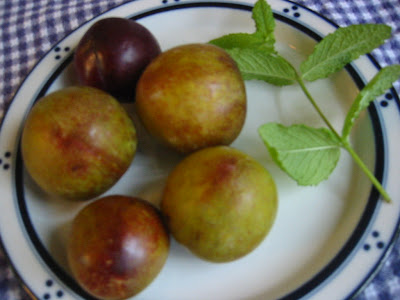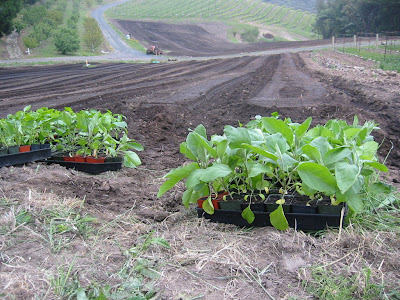The Farmstand at Oakville Grocery
Fresh, delicious produce in the heart of the Napa Valley
Sunday, August 21, 2011
Movin' On
Dear readers,
After this post, I will be handing the keys of the blog over to Omar and Jason. I have accepted an exciting job offer with Napa County's Health and Human Services Agency and will no longer be working at the farm or farmstand.
This change comes at the height of the season, so I am a little sad to leave. The tomatoes, beans, and eggplants are ripening up like crazy. The apples are coming in, too. Summer squash are turning to baseball bat size overnight. The chickens and turkeys have almost grown up. And we continue to get beeeaautiful stone fruit from farms in the area.
I hope you'll continue reading to follow the hi-jinx of Omar, Jason, and the rest of the crew. And I really hope you'll visit the farmstand. The rest of this season and seasons to come will have plenty to offer.
Sincerely,
Ben
Saturday, July 23, 2011
Little Red Hens
The chicks are growing up, too. Here is a recent photo...
... to compare with one from only a month and a half ago.
This little guy stands out among all the rust-colored Rhode Island Reds. I think he might be a Holland.
Omar is working on more mobile coops, so pretty soon the chickens will be following the turkeys to the spacious outdoors. I feel like a proud parent!
A Coop With a View
In a previous post I mentioned the turkeys' impending adolescence. Well, they sure do grow up fast. Just a few weeks later the birds have already moved out of the house ... I mean, the barn.
Their new digs? A mobile coop that Omar designed and built. The main shelter of this poultry palace is on rollers; the outdoor section is spacious but lightweight - chicken wire stretched over a pine A-frame - so that we can easily carry it around the property.
The turkeys seem to enjoy this arrangement and its concomitant fresh air, fresh food, sunlight, and exercise. But the crop land benefits as well.
Right now the coop is in the olive grove at the top of the hill. In addition to their milled feed (and some overripe fruit left over from the farmstand), the turkeys are free to snack on any weeds and insects they might find within their confines. This diminishes weeds' competition with the crops over moisture, sunlight, and growing space while reducing insect pests' predation on the crops.
Perhaps the biggest benefit from the mobile coops, though, is increased soil fertility from the nutrient-rich droppings that the turkeys leave behind. After a season of moving the coop through the orchards, vineyards, and fields, we will have to add less compost and fertilizer to the soil next year.
Thanks, turkeys! We will spend less money and use less fuel by recycling your nutrients on the farm.
Thursday, June 30, 2011
The Pits
I undoubtedly inherited a love for stone fruits. My mother is the ultimate peach fan; at the beginning of every summer, she keeps an eye out for the first peaches to hit the local grocery store shelves. She notes whether they are coming from Florida, Georgia, the Carolinas, Colorado, or California. When she discovers peaches coming from a new provenance, she buys a couple to take home and sample. If they turn out to be particularly good - that is if they are juicy, smooth-textured, sweet, and robustly flavored, she makes it a point to go back and get a ton more.
I remember being inordinately excited, while attending college in Iowa, to discover that peaches grew there. A mere four-and-a-half hours south of my hometown of Saint Paul, Minnesota, in whose Northern climate stone fruit aren't much more than an agricultural pipe dream. No matter that the Iowan varieties were only about the size of golf balls.
With this background in mind, you'll hopefully understand how happy I was to work at the Farmstand last weekend, purveying not only excellently ripe peaches, but also nectarines, cherries, plums, apricots, and pluots. Pluots, a delectable cross between a plum and an apricot, were the real champions this past weekend. Practically everyone who tried them off of our sample platter was bowled over by their sweetness and deeply floral flavor. What's more, these ruby and emerald-colored fruits came to us from neighboring Solano county. For a stone-fruit lover, I live in paradise.
Tuesday, June 28, 2011
Broad-Breasted Bronze!
Try saying that ten times fast! In addition to a tongue-twister, broad-breasted bronze is the variety of turkey we are raising. We recently added sixteen precocious young poults to our menagerie in the barn. I call them precocious because, despite being only about ten inches tall, they seem to rapidly be turning into teenage turkeys. The males are feigning adolescence by displaying miniscule fans of tail feathers to the mostly uninterested females. These creatures are also beginning to expand their avian vocabularies from infantile cheeps and whistles to more adult gobbles. All in all, they are much less timid than their next-door neighbors, the Rhode Island red chicks.
Broad-breasted bronzes are somewhat of a classic turkey. According to the American Livestock Breeds Conservancy, their ancestors were domestic turkeys from Europe and wild turkeys of North America that mated after being brought together by colonists. Over the years, breeders selected for the current variety's meat production prowess. Since the 1960s, however, commercial producers have largely given up the broad-breasted bronze for broad-breasted white turkeys.
Soon enough, we'll be moving our quickly growing birds to new digs outdoors. It's not hard to believe that they'll be full-size by Thanksgiving.
Sunday, June 19, 2011
Baby Tomatoes, Baby Chicks, and Baby Apples
Wow, it's been quite some time since I last updated! Thanks for sticking with us through these busy few weeks. There have been a number of projects in the works.
In case you were waiting with bated breath, I'm happy to report that the weather did clear up and we got the entire half-acre upper field planted. By my rough estimate, there are now close to 2000 tomato, pepper, eggplant, and basil starts in that field. Wowza! Our current project is driving metal stakes into the tomato beds, along which we will hang twine to support the plants as they grow and bear heavy fruit. We will also put in drip tubes for irrigation.
These here cuties arrived a couple of weeks ago. We are now the proud caretakers of 100 Rhode Island Red chicks. I took these photos when they were just a few days old; in the meantime they have about doubled in size. When we introduced the day-olds into the pen that Omar built for them, we had to take on the role of mother hens, gently dipping their beaks into water to show them how to drink.
Our other recent farm hijinks have included thinning young apples (from approximately five in a cluster, down to two), watering plants (it's actually getting pretty hot and dry around here), and flame-weeding (trust me, it looks pretty hard-core).
At the farmstand, we're starting to get some reaaally nice summer stone fruit (think juicy cherries, peaches, apricots) as well as berries from farms in neighboring Solano and Sonoma counties. If you're in the area, stop by next weekend for a treat!
Stay tuned for...baby turkeys?!
Wednesday, May 25, 2011
A Perfect Day for Transplanting ... Almost
This morning began momentously. With the upper field tilled and set into beds, we began to transplant our first seedlings at Mount Veeder. Omar observed that it was the perfect day for transplanting. Indeed the cool, misty weather would be kind to the scores of little tomatoes, peppers, and eggplants we were about to put in the ground, minimizing their suffering from "transplant shock."
Alas, after I had transferred merely a couple dozen tomato plants into their new earthy environs, the mist turned into a drizzle, which turned into a steady rain. The soil turned into mud, which began to stick to my boots, hands, and shovel. We had to call it a day, lest we compact the soil and ruin the beds.
We'll get those fields planted sooner or later, Mother Nature, just you wait!
Subscribe to:
Posts (Atom)





















